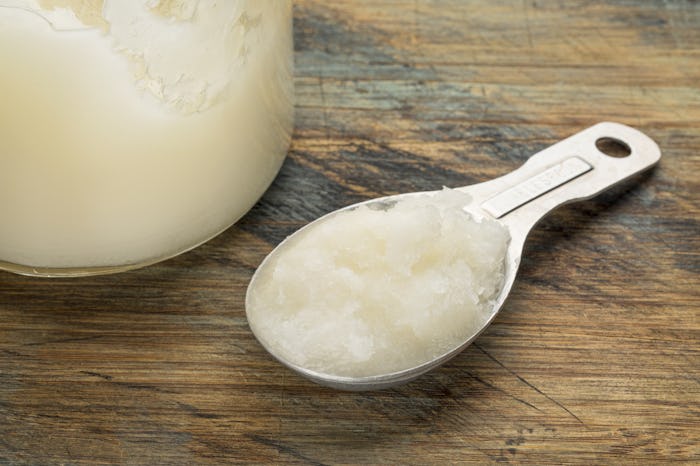Life

Here's How Coconut Oil Could Help Out Your Pregnancy Acne, According To An Expert
Pregnancy, in all its glory, has some pretty annoying side effects. Not only are you growing a tiny human inside of you, but there’s of course the nausea, heartburn, swelling, pregnancy insomnia, and stretch marks. And as if all of that and stretch marks weren’t enough, many women experience extreme skin dryness and even pregnancy acne. If you’re experiencing pregnancy acne on top of everything else, you may be wondering if there are any natural and pregnancy-safe ways to treat it effectively. Does coconut oil for pregnancy acne really work? And if so, how does something oily help with clogged pores? What kind of witchcraft is that?
Turns out, according to Ovia Health, though counter-intuitive, coconut oil does actually make your face less oily. “Applying a thin layer to any affected skin once every day can greatly help reduce the appearance of your acne, unlike other oils which can clog your pores,” the website noted. Healthline also noted that coconut oil has “antibacterial and antifungal properties,” while also being incredibly soothing to your skin and it’s easily absorbed.
Dr. Anna Guanche, a board-certified dermatologist and beauty expert who practices out of her Bella Skin Institute in Calabasas, California adds that coconut oil is antibacterial because of it’s high lauric acid content. “I am personally a big fan of coconut oil … it is great when ingested once or twice a day or applied to the skin, unless the skin is naturally very oily,” she says in an email interview with Romper.
So why do pregnant women have to deal with acne like they’re back in grade school on top of everything else? Is this some sort of cruel joke? Guanche says, “Some women get acne due to hormonal changes and adjustments, particularly in the first and second trimester. Most pregnant women have glowing, clear skin, but the reverse can also happen, unfortunately.”
If you’re not a fan of using coconut oil, or it’s just not working for you for some reason. Guanche offers some other natural alternatives to try, in addition to some tips and tricks. “Other natural solutions are sulfur-based wash and/or glycolic based cream. Both are naturally derived and safe during pregnancy,” she explains. As for other tips, Guanche says, “Cleanse with a gentle cleanser twice daily, and avoid picking or scratching. You may do blue- and red-light treatments, glycolic peels, and facials during pregnancy, but avoid salicylic acid and retinoids during pregnancy.”
Other natural tips from Ovia Health included getting plenty of zinc and vitamin C, using a pregnancy-safe face wash daily with a washcloth (not your hands, which introduces bacteria to your face), and not picking at your face. The website said pregnancy-safe face washes do not include salicylic acid or benzoyl peroxide. (Those are really popular ingredients, so be sure to give your cleanser bottle a read-through.)
If that’s still not cutting it, first of all, I’m so sorry. But Guanche says there are some medicated solutions out there that are safe for you and baby. “There are certain topical antibiotics that can be used during pregnancy — topical erythromycin and topical clindamycin can be used, as well as short-contact benzoyl peroxide washes, though I personally prefer glycolic cleansers and creams."
Pregnancy acne sucks, to put it bluntly. Add that in with all the other stuff that comes along with pregnancy, and it's understandable why you may not be feeling your best. Grab some coconut oil and see if that helps with your skin. Make it a fun spa thing for yourself and just make it an afternoon of pampering. You deserve it — you're growing a human after all.